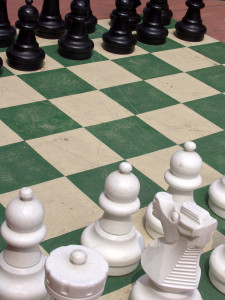emotional mastery

We all know of people who pursue mastery in such things as chess, golf, painting, cooking, musicianship, martial arts and more. But something I’ve been thinking about a lot over the past year is emotional mastery. In fact, I’ve come to believe that the importance of mastering our own emotionality cannot be overestimated; it’s actually a requirement in adulthood if we want to deal effectively with the relentless pressures, demands, frustrations and complexities of life.
And just to clarify, when I use the phrase “emotional mastery,” I do not mean to imply that we could or should achieve absolute control over our emotions. Not possible. Instead, what I mean is exactly what is meant when we refer to the pursuit of mastery in any of the crafts listed above: a high level of skillfulness, depth of understanding and an ability to produce desirable results.
therapy, creativity & growing beyond childhood
As we progress through childhood and beyond, each of us develops ways of understanding, responding to and managing our emotions. Life being what it is, it just so happens that some of the understandings and methods we develop can be effective during younger years, but work against us in adult life. This is precisely why a commitment to creativity, learning and growth is so essential during adulthood, and why they are fundamental principles of my NYC therapy practice.
What could be better for dealing effectively with codependency, anger management issues, conflicts in relationships, depression and debilitating anxiety than advancing in our ability to creatively influence and manage our own patterns of emotionality?
cognitive behavioral therapy: a practical tool for healing & growth
An invaluable tool in the pursuit of emotional mastery is cognitive behavioral therapy (CBT). CBT is a set of ideas and practices that are profoundly useful in helping us to identify our patterns of thinking and behavior that are non-constructive, self-defeating, toxic, harmful to relationships, unhelpful, etc. As the saying goes, “We cannot change what we don’t acknowledge.” But once we can genuinely identify and take responsibility for our own self-defeating patterns, we’ve opened a door onto a very valuable path of learning and personal growth. Arguably, there are few wiser investments we can make than working diligently to become more skilled at neutralizing our self-defeating patterns (of thinking, feeling & behavior), while simultaneously replacing them with constructive patterns that are aligned with our deepest values and life goals.
no pain, no gain
Achieving emotional mastery is similar to achieving mastery in any craft or art—it takes time, effort and commitment. Quite simply, it must be at the top of our priority list if we want to continuously progress in understanding and skill. Along the way, we can expect to experience plateaus where it feels like nothing is changing, as well as peak experiences that invigorate the soul and enliven the spirit. Mostly, however, it’s about consistent practice and incremental progress, one day at a time. Pursuit of emotional mastery is messy, awe-inspiring, frustrating, fun, painful, fascinating, and maybe most of all, deeply humbling—just like life.